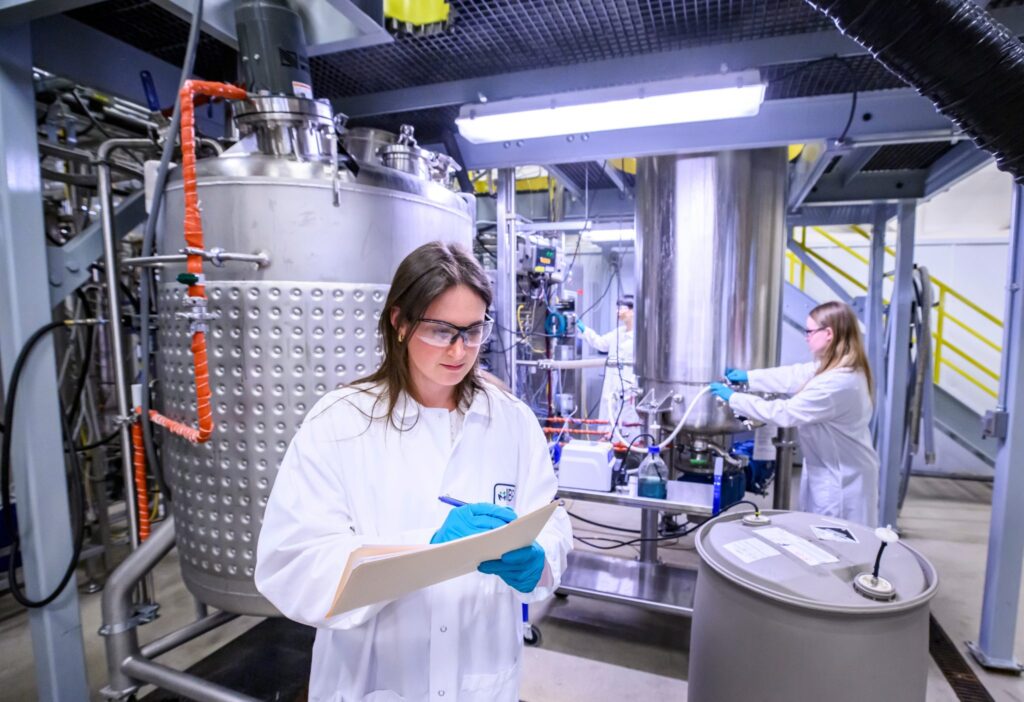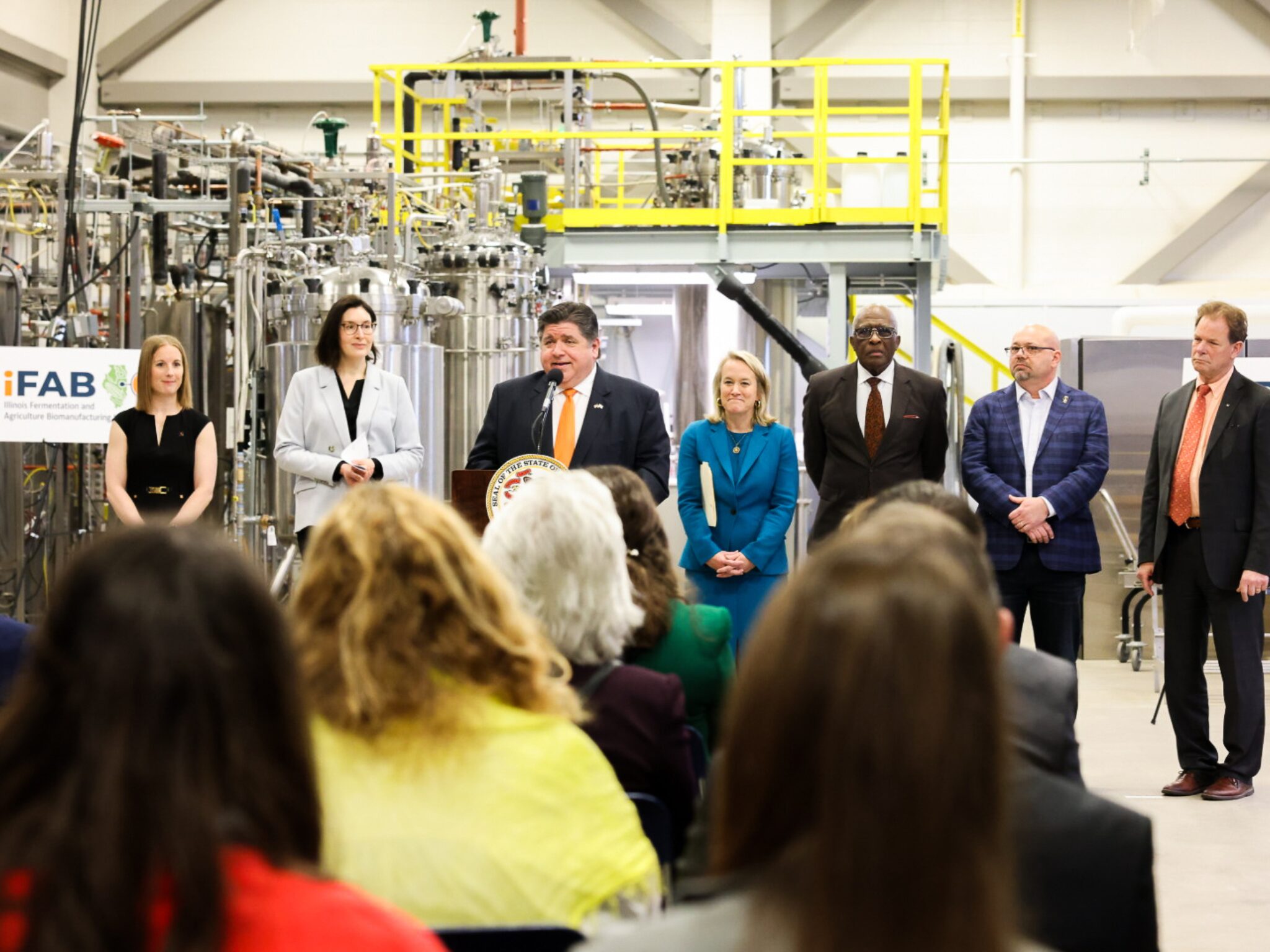Illinois Invests $680M in Biotech Hub to Promote Precision Fermentation
5 Mins Read
The state of Illinois has committed $680M to the iFAB Tech Hub, which works on precision fermentation crops like soy and corn, to advance the region’s biomanufacturing capabilities.
The Illinois Fermentation and Agriculture Biomanufacturing (iFAB) Tech Hub has received a giant sum of investment to advance its precision fermentation research, with Innovate Illinois – a public-private partnership – earmarking $680M for the biomanufacturing hub.
Led by the Integrated Bioprocessing Research Laboratory (IBRL) at the University of Illinois Urbana-Champaign (alongside 30 other partners), iFAB uses precision fermentation to convert crops like soybean and corn into high-value commodities. In October, it was recognised as one of 31 new Regional Innovation and Technology Hubs by the Biden-Harris administration. And, armed with the new capital, it aims to position Illinois as a leader in precision fermentation and biomanufacturing.
“Home to world-class institutions, modernised infrastructure, and first-rate research centres, Illinois is transforming technology, biomanufacturing, and innovation at every turn,” said governor JB Pritzker.
Kristin Richards, director of the Illinois Department of Commerce and Economic Opportunity, added: “Our economic potential is inextricably linked to our ability to innovate and lead in this vital industry. iFAB is a strategic initiative driving not only Illinois’ economy but also bolstering our national competitiveness in the biomanufacturing sector.”
iFAB aims to establish Illinois as a biomanufacturing leader

The investment comes from Innovate Illinois, which combines public and private sector players to harness federal funding opportunities, and accelerate technological and economic advancement in the state. “When universities and industry come together as partners, you see a massive increase in the speed of development and implementation,” said Robert J Jones, chancellor of the University of Illinois Urbana-Champaign and co-vice chair of Innovate Illinois.
iFAB aims to leverage Illinois’ agricultural capabilities to support economic growth and sustainable practices. “Our programme is strategically positioned to lead the charge in transforming the bioeconomy,” said Beth Conerty, associate director of IBRL and regional innovation officer at iFAB. “Through iFAB, Illinois is not just participating in biomanufacturing – we are helping shape the future of the industry.”
The biotech hub traverses multiple applications, from novel ingredients to sustainable materials, including proteins, textiles, fibres, polymers, as well as commercial-grade oils, lipids, pigments, and cosmetics. Its “lab-to-line” approach hopes to attract biomanufacturing companies into Illinois, and could help bio-innovation move from R&D into full-scale manufacturing.
As part of its designation as a Regional Innovation and Technology Hub, iFAB recently applied for a further investment for Phase 2 Implementation Grants from the Economic Development Administration (EDA), which supports the growth of the biomanufacturing entrepreneurial ecosystem, infrastructure projects for lab space and multi-use facilities, and workforce training programmes. iFAB is seeking $70M to create jobs, expand commodity markets, buy new equipment, and drive zero-emission manufacturing. (EDA will announce the winners of the Phase 2 grants in the summer.)
“With the recent designation of iFAB as one of our state’s two Tech Hub designees, alongside the remarkable strides made in quantum and advanced biomanufacturing, it’s evident that Illinois is positioned at the forefront of driving economic growth and job creation through cutting-edge research and development,” said senator Dick Durbin.
“At its core, iFAB is leveraging precision fermentation to drive innovation and catalyse the biomanufacturing industry in Central Illinois,” said Conerty, adding that iFAB has created advanced proposals for seven projects already.
Illinois has been a locus of manufacturing facilities for alternative protein companies. In September, cultivated meat producer Upside Foods broke ground on a new commercial-scale facility in Glenview, slated to make 30 million lbs of product per year (work on the plant has been paused for now, however). Fellow cultivated meat startup Clever Carnivore, meanwhile is operating from a large facility at Chicago’s Lincoln Park.
“This designation positions Central Illinois to become a global leader in biomanufacturing and precision fermentation over the next decade – bringing economic development and good-paying jobs along with it,” said Pritzer.
Investment, regulation and new products boost precision fermentation sector

The iFAB financing follows a host of government investment initiatives into fermentation and alternative proteins. Last month, the UK set aside £12M to establish the Microbial Food Hub, a research centre focused on fermentation-derived alternatives to animal products. The team will develop precision fermentation science, alongside other methods of fermentation.
Likewise, the EU will invest €50M in precision fermentation and algae-based food startups this year, as part of its Horizon Europe scheme. In Australia, meanwhile, a public-private funding effort will go into transforming an existing biocommodities plant into a precision fermentation facility. And in Catalonia, the government is investing €12M in a facility that will help companies with R&D and pre-industrial manufacturing of alternative protein ingredients, including those derived from precision fermentation.
These investments signal a growing interest in precision fermentation across the world. Last month, industry stakeholders released a refined definition of the technology to clarify its scope. It followed regulatory progress in the sector too, with New Culture, Vivici and TurtleTree all attaining self-affirmed GRAS (Generally Recognized as Safe) status with the US FDA recently for their animal-free dairy proteins.
In January, Imagindairy received a ‘no further questions’ letter for its precision-fermented whey from the FDA, joining Remilk, Perfect Day (also producing whey) and The Every Co (which works with eggs) on the list of companies with FDA GRAS status. Meanwhile, CPG giants Nestlé and Unilever have entered the space with new launches within the last month.
“Scaling [up] manufacturing and reducing costs of production is critical for these ingredients to be able to effectively compete with animal-derived ingredients,” Irina Gerry, vice-chair of the board of directors at the Precision Fermentation Alliance and chief marketing officer at Change Foods, told Green Queen last month.
“The industry is addressing it in multiple ways. We see new types of private and public funding, university training programs, industry partnerships, and contract manufacturing companies getting established to support these efforts. It won’t happen overnight, but the process is underway.”



